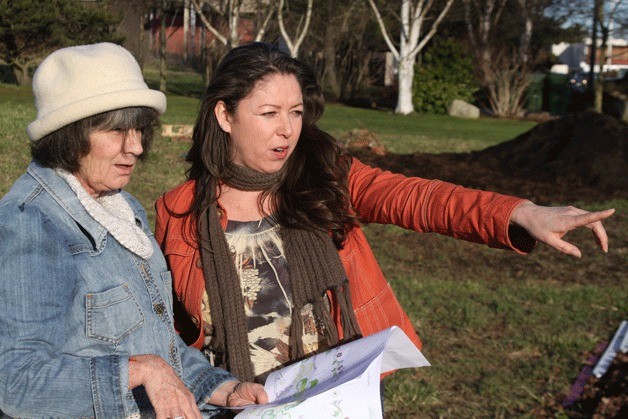In its present state, the land appears to be nothing more than a barren field dotted with freshly planted trees, small mounds of dirt and a wall covered in plastic.
Netsah Zylinsky looks deeper into the landscape and the future and sees something altogether different.
“I hope we can feed many, many people,” she said.
Since the first shovel of dirt was raised in January, work parties have gathered nearly every Saturday on an empty parcel of land on Bayshore Drive in Oak Harbor to work on a massive community garden project designed to help feed those on Whidbey Island in need.
Called the Imagine Permaculture Food Forest, the idea of a self-sustaining urban garden has been dancing in Zylinsky’s mind for years. The concepts were rooted in classes she and her husband Michael Zylinsky took 20 years ago from Bill Mollison, who is considered the “father of permaculture.”
The Zylinskys, who moved to Oak Harbor 12 years ago, have been educating others ever since.
Partnering with SPIN Cafe and the Oak Harbor Garden Club, and using land donated by the City of Oak Harbor, the Imagine Permaculture Food Forest broke ground three months ago and has already moved into its fourth phase of planting trees.
It’s an elaborate plan involving a permaculture design and urban forest practices, implemented by a volunteer base led by co-chairs Zylinsky and Christine Pace.
What you see so far is merely the foundation being laid, according to Zylinsky.
“We’re just beginning,” she said. “This is a two-year project.”
The design promotes self-sustainability with water holding to the land and a canopy of trees that both shield wind and provide more favorable conditions for other plants.
Volunteers began soil-building in the project’s first phase, then started construction of a strawbale cob wall intended to be a windbreak.
The group had to delay the completion of the wall because of their spring time line.
“We realized our window for planting started to close on us,” Zylinsky said.
This month, with an archeologist on site to monitor digging, 135 holes were dug to make way for trees and berries. About 50 fruit trees have been planted so far, ranging from apple to peach to pear.
It will all be a part of what is described as a “nine-story edible companion food forest” that will include tall layers of nut and nitrogen-fixing vines, medium layers of semi-dwarf fruit trees and multiple layers of berries, perennial and annual vegetables, herbs and more.
Swales are being designed in the ground to hold water near plants.
Using environmentally-friendly permaculture methods, every detail is thought out.
Zylinsky taught permaculture classes at the SPIN Cafe to familiarize volunteer helpers with the concepts and gardening practices. With permaculture, care of the earth and people, and returning surplus back to the earth, is foremost.
The plan in Oak Harbor is to be able to grow food for the nearby SPIN Cafe, which serves free meals on Tuesday and Thursday nights, and make food available for the community who visit the garden.
Oak Harbor’s food forest will be only the second of its kind on the West Coast and third in the United States, joining Beacon Hill in Seattle and one in Boston, Zylinsky said.


